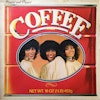Shorty’s Portion was the creation of Steven J. Salazar, a young, twenty-something Angelino who rocked shaggy, shoulder-length hair, and an impressive ’70s ’stache. Raised in the sleepy pocket neighborhood of El Sereno on L.A.’s Eastside, Salazar was an aspiring singer, composer, and multi-instrumentalist, fueled by a creative intensity rooted in his own mortality; Salazar was born with a congenital heart issue that stunted his growth and eventually contributed to his death in 1979 at just age twenty-six. His late mother, Lilian Salazar, once told me that “he could be funny as all hell, and he could be angry as all hell. He had cause for anger. He was cut short in life and he knew it.”
In the later ’70s, Salazar recorded with the South Bay punk band the Skabbs, but the 1975 Shorty’s Portion album was a fuller realization of his eclectic musical imagination, with seven of its ten tracks produced, written, and arranged by Salazar himself. Heavily influenced by Frank Zappa, Salazar mixed prog rock, funk, pop, and jazz touches with an operatic scope of ambition. By any conventional standard, he was a flawed, off-tune singer, but those qualities also made his recordings memorable in an outsider-artist way. Isn’t Anybody Going to Help That Poor Man? could only ever have been a private press record, and that’s precisely its charm; it is deeply, unmistakably personal in its creation and execution. And yet, as much as the LP was Salazar’s magnum opus, the one song off it that found a second life wasn’t actually his.
Salazar formed Shorty’s Portion as a music student at USC, and he and his friends called themselves the USCateers, in homage to The Three Musketeers. They participated in a songwriting contest, and Salazar decided to include three of those songs on the Shorty’s Portion album, all in a row, on Side B. The first of those was “Fantasy Child,” written and performed by David Layne, who, originally from Baltimore, had come out to USC to study Music Composition.
Fantasy Child” opens as an achingly melancholy ballad about a young woman with a verdant imagination, but it unexpectedly swings up into a fast-paced workout marked by a memorable solo on an ARP Odyssey synthesizer. In 2011, Mayer Hawthorne, who had been gifted a copy of the Shorty’s Portion album from Peanut Butter Wolf, recorded a version of the tune for his digital EP of cover songs, Impressions (finally released on vinyl in the summer of 2021). Hawthorne entitled his cover “Fantasy Girl,” and, though he removed the abrupt tempo change, he still sung it with a similar, soft falsetto that Layne crooned with on the original.
Layne would later become a composer for film and television when he wasn’t managing organ stores or working with his wife as a kitchen and bath designer. He wasn’t even aware that his obscure composition from 1975 had been covered decades later until I tracked him down, eventually meeting him at the Monrovia church where he served as musical director. He admitted that the inspiration behind “Fantasy Child” was someone he had a crush on. “You don’t have any money when you’re a student,” he explained, “but if you can write songs, that’s pretty powerful currency.”
After initially listening to Hawthorne’s “Fantasy Girl,” he called fellow USCateer, Terence d’Balboa, and told him, “You can’t believe what I just found out. Shorty’s Portion has come back to life!” He was amazed at how “something that we did, that was so much fun at the time—it’s like a signpost you passed—thirty years ago, and all of a sudden it pops back up.”
Layne also mused that if Salazar had lived, “[he] would love this. He would probably say that he planned it,” adding, “I think he would just be so delighted, because…if there was ever anyone that would want to be a cult figure…it would have been Steve.” As for his humble composition, Layne gave Hawthorne his propers: “I thought it was well done,” but unsurprisingly, he also thought, “Well, you know, I like my version better.”


